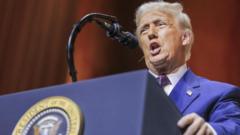Ahead of upcoming parliamentary elections, Greenland’s Parliament has enacted legislation that prohibits foreign and anonymous financial contributions to political campaigns. This decision reflects a growing unease among Greenlanders regarding President Trump’s previous remarks about acquiring the island, as well as his son Donald Trump Jr.'s recent visit to the locale. The newly instituted law aims to protect the country’s political autonomy from potential external influence, directly referencing the geopolitical implications of foreign interest in Greenland.
**Greenland's Bold Move: Legislation Against Foreign Political Contributions Amid U.S. Tensions**

**Greenland's Bold Move: Legislation Against Foreign Political Contributions Amid U.S. Tensions**
In a strategic response to external political pressures, Greenland has enacted a ban on foreign funding in politics, coinciding with concerns over U.S. interest in the territory.
The urgency to enact the law illustrates the reactionary stance of Greenland's government in light of Trump's comments where he did not dismiss the idea of using military force to assert control over the territory. The legislation is framed as a measure to safeguard the "political integrity" of Greenland, thus reinforcing the island's position as a semiautonomous entity.
As the debate unfolds, the strategic location of Greenland, rich in minerals and close to U.S. military installations, places it at the center of not only economic but also geopolitical tensions. Observers note that as Arctic ice melts due to climate change, competition for resources in the region is likely to intensify, making Greenland an area of pressing interest for global powers.
The next parliamentary elections are set for March 11, signaling a pivotal moment for Greenland as it navigates its relationship with external entities while trying to assert its sovereignty and political independence in the face of increasing foreign desire for influence.
As the debate unfolds, the strategic location of Greenland, rich in minerals and close to U.S. military installations, places it at the center of not only economic but also geopolitical tensions. Observers note that as Arctic ice melts due to climate change, competition for resources in the region is likely to intensify, making Greenland an area of pressing interest for global powers.
The next parliamentary elections are set for March 11, signaling a pivotal moment for Greenland as it navigates its relationship with external entities while trying to assert its sovereignty and political independence in the face of increasing foreign desire for influence.





















